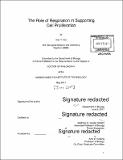The role of respiration in supporting cell proliferation
Author(s)
Gui, Dan Y. (Dan Yi)
DownloadFull printable version (9.486Mb)
Other Contributors
Massachusetts Institute of Technology. Department of Biology.
Advisor
Matthew G. Vander Heiden.
Terms of use
Metadata
Show full item recordAbstract
Compared to non-proliferating cells, proliferating cells such as cancer cells have additional metabolic requirements for generating biomass. However, despite these additional requirements the components of the mammalian metabolic network in both proliferating and non-proliferating cells are largely the same. Thus, in order to balance the competing anabolic and catabolic needs of a proliferating cell, the same metabolic networks components must take on distinct roles. Understanding how the various network components support proliferation may lead to improvements in cancer therapy. It has long been known that mitochondrial respiration is essential for proliferation. However, the precise metabolic role that is filled by respiration is not well defined. This thesis focuses on understanding the role of respiration in supporting mammalian proliferation. In non-proliferating cells respiration is considered to be primarily an ATP-producing catabolic process. We find that in proliferating cells, respiration serves a crucial anabolic role by providing access to an electron acceptor in the form of molecular oxygen. Electron acceptor availability is required for maintaining NAD+/NADH homeostasis and supporting aspartate synthesis. In conditions where alternative electron acceptors are provided such that cells can maintain NAD+/NADH homeostasis through alternative pathways, or when exogenous aspartate is provided, respiration is dispensable for proliferation. These findings highlight that metabolic dependencies can be modified by environmental conditions. Consistent with this, we find that altering NAD+/NADH homeostasis through alternative pathways or providing exogenous aspartate can modulate cellular sensitivity to respiration inhibitors such as metformin. Collectively, these studies contribute to an understanding of how metabolism supports biomass generation for proliferation and offers insight to how metabolism could be targeted for cancer therapy.
Description
Thesis: Ph. D., Massachusetts Institute of Technology, Department of Biology, June 2017. Cataloged from PDF version of thesis. "May 2017." Page 163 blank. Vita. Includes bibliographical references.
Date issued
2017Department
Massachusetts Institute of Technology. Department of BiologyPublisher
Massachusetts Institute of Technology
Keywords
Biology.